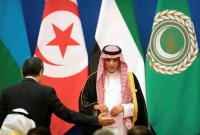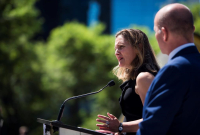Support strong Canadian climate journalism for 2025
Members of Canada's Muslim community say recent tensions between Ottawa and Saudi Arabia are affecting some people's ability to perform what's seen in the faith as a fundamental religious right.
They say many currently embarking on hajj, a pilgrimage to the holy city of Mecca in Saudi Arabia, are anxious about their travel arrangements in light of the simmering spat, which has seen the country's state airline cancel flights to and from Canada.
At least one travel agent also says some would-be pilgrims decided not to follow through on their travel plans after tensions between the two countries flared up unexpectedly earlier this month.
The diplomatic dispute began when Canada's Ministry of Global Affairs sent a tweet calling for Saudi Arabia to "immediately release" two women's rights activists currently detained in jail.
The kingdom reacted by severing diplomatic ties, suspending future trade, recalling students from Canadian schools and cancelling the state airline's operations in Canada.
People in contact with hajj participants say the move involving the airline has complicated return travel plans for many, and add that they are anticipating other post-pilgrimage issues.
"We are having a lot of problems," said Syed Ahmed, Operation Manager at King Travel agency specializing in trips related to hajj and other religious occasions. "Almost we can say 25 per cent of people are asking for a refund."
Ahmed said travellers booked with the Mississauga, Ont., agency frequently flew to the kingdom using Saudia, the state airline that previously operated at least two direct routes departing from Toronto's Pearson International Airport.
But Saudia cancelled those routes effective Monday, leaving travellers who used their services to reach the country with questions as to how they can return home.
Ahmed said Saudia has offered to cover the costs of transferring tickets to other airlines, but said spaces — already at a premium during the hectic hajj season — are extremely hard to find.
But logistical arrangements are only part of the problem, according to Imam Syed Soharwardy, head of the Islamic Supreme Council of Canada.
Hajj, which officially gets under way later this week, looms large in the consciousness of all practising Muslims, Soharwardy said.
All followers of Islam with the physical and financial means to make the pilgrimage are expected to do so once in their lifetime, he said. Those who undertake the trip to Mecca seek forgiveness of past sins and hope to draw closer to God.
The annual pilgrimage draws people from around the world to Saudi Arabia each year. The crowds, squeezed shoulder to shoulder in prayer five times a day, fill the city of Mecca and surrounding areas to perform a number of physically demanding and intricate rites.
Soharwardy said members of congregations spanning from Montreal to Vancouver who are making the trip fear they won't be in a fit state to deal with the hassles of shifting, uncertain travel arrangements.
"Whether the person is a very young man or woman or old man or woman, they get so tired because hajj is not easy," he said. "Hajj is a very cumbersome, tiring ritual and some people get sick."
Many, he said, also feel anxious about the prospect of travelling on a Canadian passport at a time when open suspicion of Ottawa seems to dominate among Saudi authorities.
But Soharwardy said many wary travellers will forge ahead with their plans, saying most have spent years saving up for a once-in-a-lifetime journey or may fear their physical condition could change and leave them unable to go through with the arduous pilgrimage another time.
Soharwardy called on the Canadian government to offer support to pilgrims who may encounter difficulties.
The Canadian government has maintained talks with Saudi authorities, but has refused to back down on its critical stance against the kingdom's human rights practices.
Prime Minister Justin Trudeau recently said Ottawa would like to improve its relationship with Saudi Arabia, but will not sacrifice Canada's position on human rights.





Comments